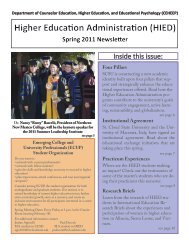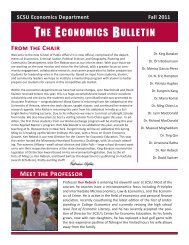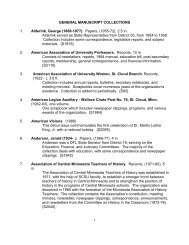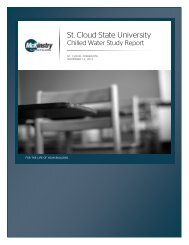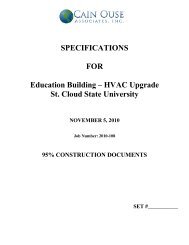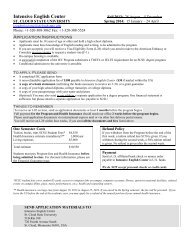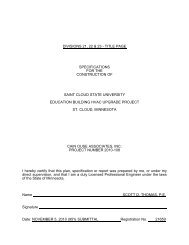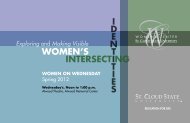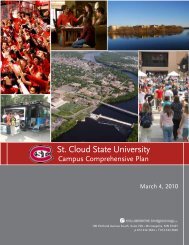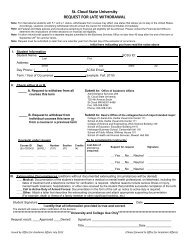2008 Proceedings - St. Cloud State University
2008 Proceedings - St. Cloud State University
2008 Proceedings - St. Cloud State University
You also want an ePaper? Increase the reach of your titles
YUMPU automatically turns print PDFs into web optimized ePapers that Google loves.
Abstracts<br />
Session ZD Science and Engineering IV North Voyageurs<br />
Mechanical and Manufacturing Design Projects for Vascular Solutions, Inc<br />
Ethylene glycol ethers (EGEs) especially 2-ethoxyethanol and 2-butoxyethanol (BE) are excellent solvents. Accordingly they are used in<br />
many industrial and commercial products. Upon human use these solvents are discharged into waterways. Given the use and discharge<br />
of EGEs, both humans as well as aquatic animals are exposed to EGEs. Exposure to EGEs results in various toxicities including<br />
encephalopathy, hemolysis, and metabolic acidosis in humans. In addition to these toxicities, carcinogenesis and mutagenesis is also<br />
observed in animal models. Actual concentrations of EGEs in waste water discharges are not clearly established accordingly, the<br />
objectives of this research project is to develop methods to determine the presence of butoxyethanol (BE), one of the most common EGEs<br />
used, and its possible metabolites butoxyacetaldehyde (BAL), and butoxyacetic acid (BAA) in waste water sample. We are currently<br />
standardizing a gas chromatography mass spectrometry method for this purpose and are in the process of developing a high performance<br />
liquid chromatography method.<br />
Presentation Index: ZD3<br />
Time: 5:40 p.m.<br />
Department: Mechanical and Manufacturing Engineering<br />
Project Sponsor(s):<br />
<strong>St</strong>udent Presenter(s): Yang, Phillip; Lim, James; Yee, Jong-Shan<br />
Baliga, Bantwal<br />
Session ZE Social Sciences II North Glacier<br />
<strong>St</strong>ate Mandates and Health Care<br />
Every state in the US has different laws mandating that certain services, or benefits be provided by the employer‘s healthcare plan.<br />
Mandate laws range from statutes that require health plans to cover services by particular types of providers, requirements to cover<br />
specific diagnostic or treatment services or laws to extend benefits to certain populations. While providing more access to services, the<br />
increasing number of laws mandating healthcare plans causes prices for employers to insure their workers to increase significantly. There<br />
has been concern whether all the mandates will be too costly and effect how many people are insured. This paper considers the<br />
relationship between the amount spent on healthcare in each state and state mandates. The main issue is the large and growing amount<br />
of money being spent on healthcare, the potential budget busting effect this growth could possibly have, and the role state mandates play<br />
in creating and perpetuating this problem. Two types of analysis are done, one testing the effect of the more costly mandates (as defined<br />
by benefits costing more than one percent of estimated cost) on the amount spent on healthcare, and the second testing whether how<br />
many mandates a state has affects the level of healthcare spending.<br />
Presentation Index: ZE1<br />
Time: 5:00 p.m.<br />
Department: Economics<br />
Project Sponsor(s):<br />
<strong>St</strong>udent Presenter(s): Bargabus, Kathryn<br />
Grossman, Philip<br />
The Colonial Legacy in Africa<br />
A significant amount of challenges facing the African continent today are in large part, a direct effect of the colonial experience brought<br />
upon the African peoples by the European powers. There are many historical factors which have greatly impacted the continent. This<br />
presentation seeks to examine the causes and consequences of colonialism in Africa in order to provide a better understanding of<br />
contemporary Africa. The presentation concludes by suggesting ways in which Africa, Europe, and the entire global community could<br />
collectively share the responsibility of finding ways to construct a promising future for the African continent and its peoples.<br />
Presentation Index: ZE2<br />
Time: 5:20 p.m.<br />
Department: Political Science;<br />
Project Sponsor(s):<br />
<strong>St</strong>udent Presenter(s): Franzen, Angela; Winscher, Damon; Kanenza, Benita<br />
Nyendu, Morgan<br />
<strong>St</strong>. <strong>Cloud</strong> <strong>St</strong>ate <strong>University</strong> <strong>St</strong>udent Research Colloquium 76<br />
April 22, <strong>2008</strong>





